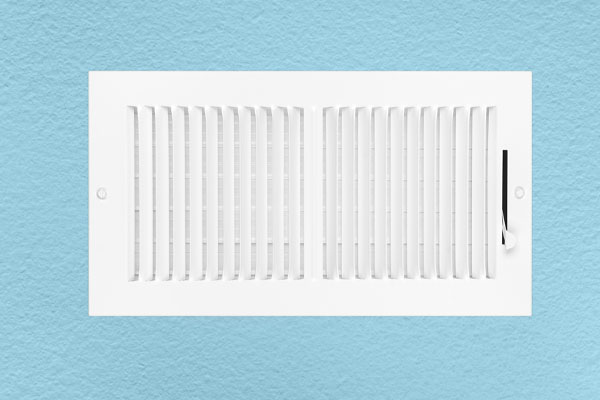Reasons To Avoid Closing Your Registers For Temperature Control

Many homeowners try to save on their heating and cooling expenses by closing the vents in rooms they aren’t using. There is a simple logic behind keeping the wall vents open or closed. Closed vents allow the heated or cooled air to be redirected somewhere else where it is needed, maximizing the use of conditioned air. It may sound reasonable, but it can actually be costing you more in the long run. It also damages your HVAC system.
Reasons To Avoid Closing Registers For Temperature Control
Contents
Read on to learn the reasons you should keep your registers open. This also includes several tips on saving energy using HVAC zoned solutions.
How HVAC Ventilation Works
There is a high chance that your home has a closed system that allows air to be filtered, so it remains clean and safe to breathe. The house is essentially closed, so the air stays motionless when there isn’t an external force, like a fan, to move it. A blower fan in a forced-air system helps circulate the air throughout the house. The air in a home with an HVAC system is moved to condenser coils for cooling or moved from the heating part (such as a furnace), where the air is heated and distributed throughout various areas.
The HVAC system in your home may have a fan motor that has a fixed or variable speed. A fixed motor keeps a steady rate regardless of the air pressure indoors. Meanwhile, a variable motor makes automatic adjustments per the pressure it senses. Having a fixed motor is cheaper and usually doesn’t have a complex set of parts to operate. However, expect your system with a fixed motor to work harder to move and redistribute air through a limited area.
Why It Isn’t Recommend To Close Your HVAC Air Registers
Closing the vents is certainly not a money-saving method you should do. Listed here are several reasons it isn’t the way to go when you want to save on energy costs.
Your HVAC System Doesn’t Work How You Might Think
The heating or cooling system doesn’t have a built-in sensor that determines when and which registers are open or closed. Therefore, it will continue to use the same energy level to generate the same volume of cold or warm air. It maintains the thermostat setting. The HVAC system will not slow at all for as long as this setting on the thermostat is in place, so you will still pay for the same amount of energy.
Imbalance In Pressure Will Be Created
Closing the register to try and save energy means you are closing the supply register. The return register that draws air from the room remains open. It creates a lower pressure because the return register takes air from an enclosed space. The depressurization of the room pushes outdoor air to get inside through tiny cracks, gaps, and holes. This results in the destabilization of the temperature of the indoor air, which can decrease or increase depending on the outside air’s temperature. This may also cause the degradation of the indoor air quality.
Uneven Room Temperature

The HVAC system is equipped with internal dampers that adjust to control the air supply volume in each room. It is necessary to make these adjustments to ensure adequate airflow volume for your HVAC system so that there are consistent temperatures. This is regardless of how near or far the room is to the blower. Closing one or more supply registers disrupts the temperatures and airflow balance in the rooms and throughout the whole system. This imbalance may cause too much airflow in the rooms closer to the blower, while rooms farther away will have too little airflow.
Increased Risk Of Wear-And-Tear To The HVAC System
Closed supply vents increase the static pressure within the supply ducts. As a result, there is increased pressure on the system blower, which puts more strain on the blower. A system blower that continuously runs under increased stress is more likely to succumb to wear and tear and have a shorter service life.
What To Do To Save On Your Home Heating & Cooling Costs
Remember that the size of your HVAC system is dependent on your home’s measurements and other factors. The system can heat or cool the specific amount of space your home has when its size matches your home’s area. Closing the vents only reduces the amount of space, so the system cannot work properly.
Use a system with zone temperature control if you want money-saving features while keeping a comfortable home. This lets you divide your home into several zones. For instance, the rooms upstairs, the rooms downstairs, and the basement can be three different zones. You can have different temperatures in different zones with zone temperature control.
You can adjust the thermostat setting that allows your HVAC system to run at the minimum or have the fans circulate the air indoors. Put window treatments in place so that indoor temperature is maintained. Leave doors open to rooms that are too cold or too warm, so air can be distributed evenly.
You can also install a ductless HVAC system as a supplementary system to your central unit. Ductless systems offer zoned control, and you can install them in rooms you use more often. This allows you to adjust the thermostat settings of your central HVAC system so that it runs less and customize your comfort in the rooms you are occupying. Consult an HVAC contractor, like R.F. Ohl, to learn more.
Call R.F. Ohl For All Of Your HVAC Requirements

Call R.F. Ohl when you need a trusted HVAC service provider. We offer excellent and affordable heating and cooling services, including replacements, repairs, installations, and maintenance.
Rest assured, we can provide you with friendly and knowledgeable service at highly competitive prices. We ensure our customer’s satisfaction by delivering honest and exceptional services.
Learn more about what we can do for you by calling R.F. Ohl today! Schedule a free, in-home consultation with one of our professionally certified HVAC technicians. You can count on us to provide you with affordable and practical solutions. Call R.F. Ohl now!
Click here to contact us today or give us a call at (610) 377-1098 if you have any questions.